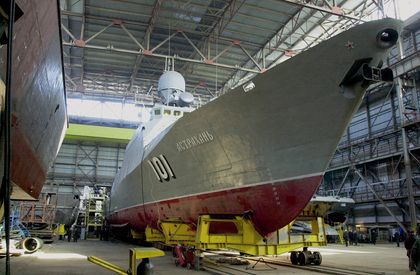Consolidation of state-owned assets with simultaneous openings for private capital, primarily in science-driven sectors, is continuing. The process of setting up an extensive network of specialised stateowned holding companies or corporations, which had temporarily come to a standstill, has gained new momentum following the recent government reshuffle. Apart from the Development Bank, which is almost ready for business, and the aircraft and shipbuilding corporations, currently being organised, the list will be extended to include new corporations in the defence and nuclear sectors.
Corresponding legislation was approved by parliament in first reading: Rostekhnologii on October 9 and the nuclear corporation on October 12. Following a tested scheme, the new corporations will include existing management structures, numerous specialised federal state unitary enterprises and joint stock companies with 100% state-owned capital. After these giants are in place, the creation of a machine-manufacturing holding could get the go-ahead, despite proposals last summer to replace it with a far smaller engineering centre.
Natural monopolies and cabinet rule... State-owned corporations can be viewed as an alternative to naturalmonopolies like Gazprom and RAO UES. Their subsidiaries can take market initiatives, including IPOs. After state-owned holdings are established in the defence and nuclear sectors, the most promising industrial companies will be removed from direct ministerial control. It is important to remember that among companies with a significant share of state capital and producing high-tech products, sectors such as transport and generator construction as well as some car plants and engineering firms servicing the steel industry have remained outside the “corporate scheme.” The prospect of a significant number of efficiently operating industrial enterprises being reorganised as corporations means that key federal ministries will become ordinary industry regulators without direct subordinates. This is a European variant of the so-called corporate state, since even in the United States a substantial number of enterprises are subordinated directly to government departments. In Russia, attempts to create a version of the corporate state failed both in the late 1920s following the New Economic Policy era and under Nikita Khrushchev in the 1950s.
That was under socialism. But even the current initiative generated resistance from Russia’s ministries, with their long tradition of “cabinet rule.” A clear sign of this resistance was seen in the autumn break that legislators took during the first reading of the bills on defence and nuclear holding companies. Referring to Rostekhnologii (the nuclear holding was at the time not discussed) then prime minister Mikhail Fradkov stated: “The most important thing is not to believe that a new corporation will resolve substantial problems through improved management; we should meticulously consider any corporation, especially a state-owned one, and set them up cautiously, ensuring that they bring advantages instead of the other way round.” The alternative to the corporate state, the establishment of specialised federal agencies within ministries and state committees, is well known. But this directly contradicts the idea of reducing financial burden on state budgets and does not agree with the global initiative of building the “power vertical”, resulting in a dissipation of efforts rather than the efficient delegation of power.
Still, some doubts are justified about whether Russia needs this indiscriminate network of holdings: despite its marketoriented nature, its vertical management structure, and its cross ownership of shares, it has yet to prove more efficient in Russia than the traditional ministerial subordination.
This is especially important if a holding or corporation is meant to comprise totally different enterprises. It’s no coincidence that almost all of the new holdings have been divided into specialised sub-holdings.
In the past, there were proposals to create up to 400 state-owned holding companies in Russia, including industries with no shortage of private capital. This radical idea was rejected, because it boiled down to “partnership under administrative pressure,” according to Arkady Dvorkovich, a top expert in the Kremlin administration.
A cure-all solution? As holding companies are created, there is bound to be resistance from private investment, too. After the Soviet Union’s breakup, many defence companies went private, despite all restrictions on their privatisation. In many cases, the government lost not only a blocking stake, but even the golden share, which gives the owner the right of veto. Direct nationalisation is almost impossible, especially as it will dash all hopes of attracting investors.
At the same time, participation in a state-owned holding requires transfer to the state of a blocking, if not a controlling, stake in the company. This will inevitably reduce private shareholders’ control over management and, therefore, affect investment attractiveness. On the whole, the holding scheme does not seem to be a cure-all.
To ensure the efficient development of Russian industry, a sensible compromise between market-oriented and purely administrative management systems has to be found.













